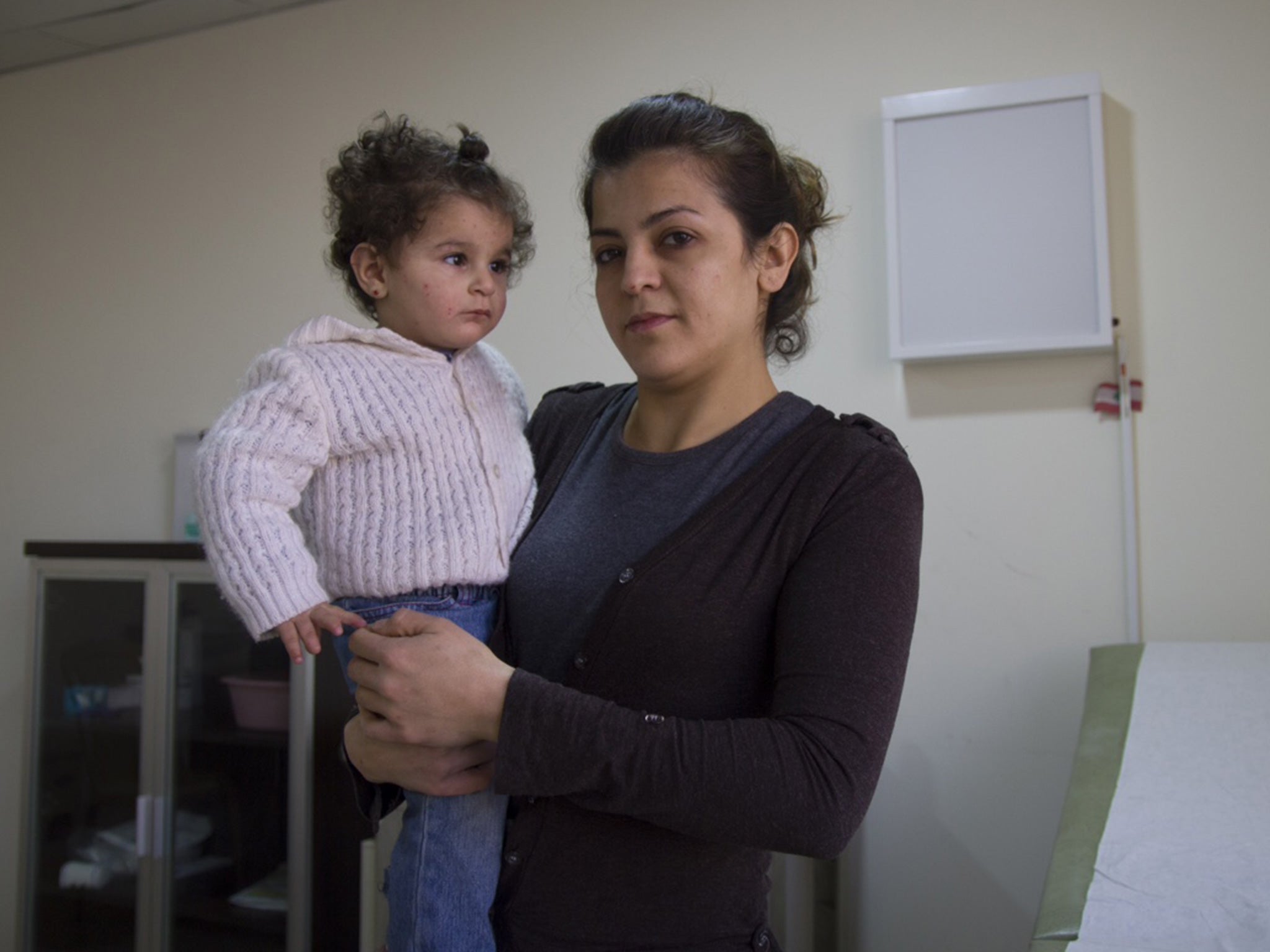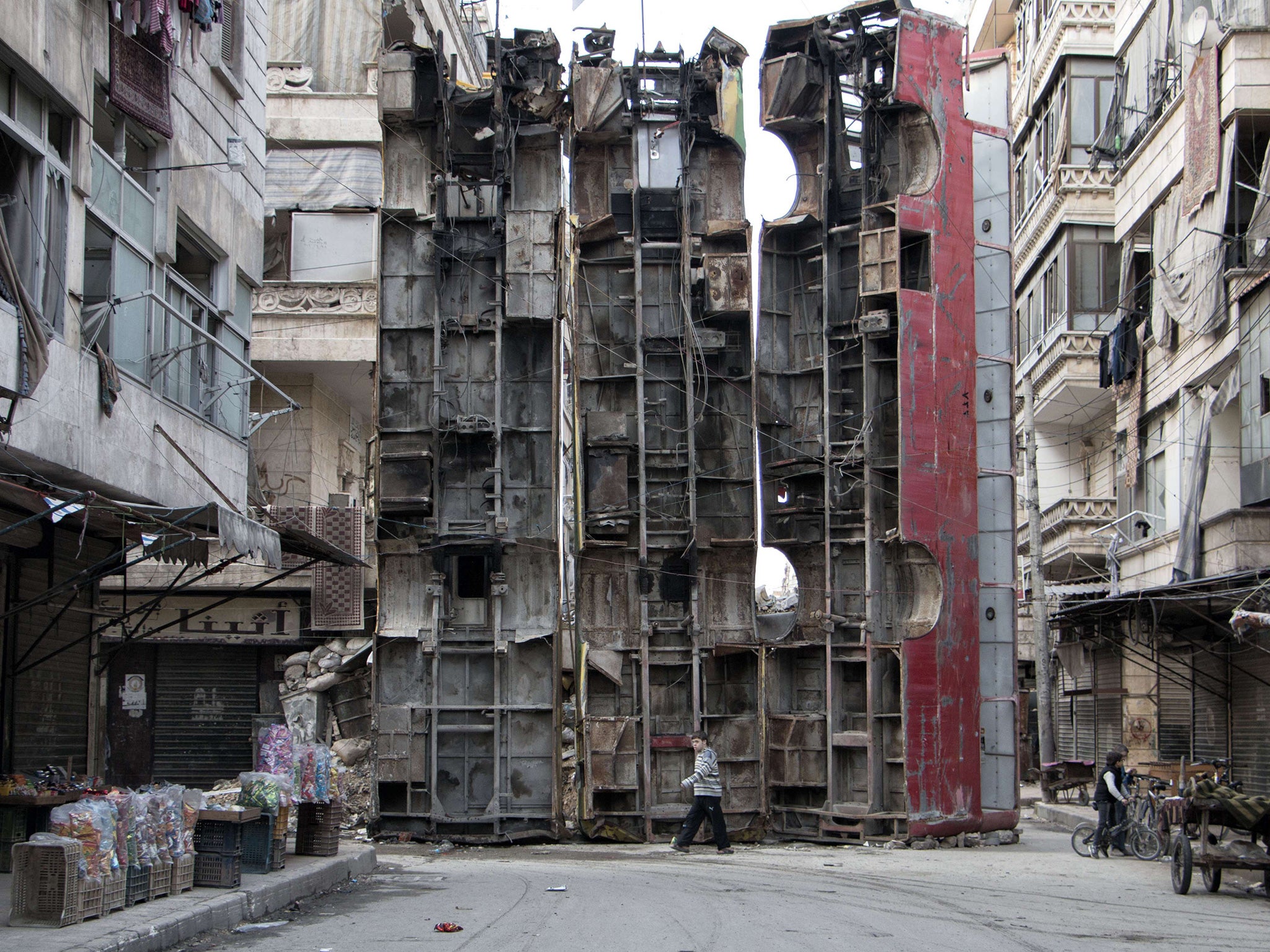Syria revolution four years on: A new life but little hope for the millions displaced by the bloodshed
Conditions are harsh for one refugee and her disabled child who fled to Lebanon

Hanigal Tareq lives in one room with her disabled 15-month-old daughter and five other people in Dowra, an overcrowded district just outside the Lebanese capital. Asked where her husband is, she breaks into tears.
Far more significant than Mothering Sunday for Hanigal and millions of others like her, today is the fourth anniversary of the start of the war in Syria, in which some 200,000 people have died. A member of Syria’s Christian minority, she endured more than three years of the conflict, but finally fled her home north of Aleppo last September after her husband disappeared. “I don’t know where he is,” she says, clinging to her daughter, Helena. “He went out as normal one day, and never came back.”
The chances are that Hanigal will never find out what happened to her husband. She is not alone: many Syrians have been killed without their families knowing their fate. The Syrian Network for Human Rights estimates that 85,000 people have been seized by the regime, and the factions fighting Damascus are also responsible for large numbers of disappearances.
The bloodshed has driven almost half of Syria’s 23 million people from their homes. More than six million are displaced within the country, with another four million having fled across the borders. Hanigal, 33, is among the 1.6 million Syrians who have escaped into Lebanon, swelling the population there by roughly a quarter. Life is a struggle for all, but few have as many disadvantages as she has.
Hanigal was born with dislocated hips, and still walks with a heavy limp. It is easy to understand that once her husband disappeared and all her relatives had left Syria, she was unable to cope at home. “I came to Lebanon just for Helena,” she says. Her daughter, though normally afraid of strangers, giggles joyfully at a game of peekaboo, unaware of her mother’s fears for her.
Helena, it emerges, has many severe health problems, because of a genetic disorder. A malfunctioning thyroid has caused abnormalities around her body. She has wheat and milk intolerances, and needs an operation to correct one of her legs. What causes Hanigal most anxiety, however, is that Helena has only 15 per cent vision, because she has cataracts in both eyes.
“I really need help with Helena’s eyes,” says her mother. “I don’t want her to lose her sight. The eyes are dear to a human being. I am afraid to get the eye operation done in a place that is not good, and risk her losing her sight altogether.”
Refugees arriving in Lebanon often have to wait for several weeks before they are registered by the UN, during which they receive no official support. Organisations such as Caritas Lebanon, supported by the UK aid agency Cafod, try to plug the gap by providing food, clothing, shelter and medical services as well as further support after registration, particularly for vulnerable families.
Hanigal now receives food coupons from the UN, and at least has a roof over her head, an improvement on her situation when she first reached Beirut. “When I arrived here I was living on the streets, with nowhere for me and Helena to go,” she says. “A Syrian woman who saw us on the street took pity on us.” Bruno Atieh of Caritas Lebanon says “a spirit of co-operation” remains among Syrian refugees, despite the harsh conditions in which so many of them live.

Caritas paid for Helena to receive initial treatment at the St Michel medical social centre in Beirut, run by the charity, but with limited funding and more refugees arriving all the time, it cannot offer the child the operations she needs, or provide expert diagnosis of her other conditions. “Helena is a complicated case,” said Zalfa Antoun, the clinic’s medical director. “We don’t know the cause of her problems for sure. So far we understand that she has a genetic disorder of some kind.”
But with no end in sight to the war, and resources stretched to the limit, aid organisations are struggling to meet refugees’ most basic needs. In January, a winter storm brought rare snowfalls in parts of the Middle East, and a number of Syrian refugees in Lebanon froze to death. “We are using much of the funds we have just to keep people warm,” said Mr Atieh.
As Helena plays with a pen and a piece of paper, her mother explains that she feels helpless. “I can’t work, and we have no one to support us financially,” she says. “Caritas alone cannot cover what we need.” She also feels guilty for the strains they are imposing on the people they live with.
“There were already 15 in the house. We make it 17,” says Hanigal. “I don’t have any problems with the other residents. But we can only shower once a week. We sleep seven people in one room. We are all women, but still it is hard. It’s very stressful, because Helena wakes in the night a lot. It’s OK for me – I’m her mother – but I know that other people in the room have to get up and go to work in the morning.”
I made the mistake of asking Hanigal what she wanted for her daughter. It simply brought back the tears. Why should she have to spell it out, when every mother, from Syria to English suburbia, wants the same thing? For her child to be healthy, happy and safe.
The work of Caritas is supported in England and Wales by the Catholic aid agency Cafod (cafod.org.uk). Until 17 May, donations to Cafod’s Lent appeal will be matched by the UK Government
Join our commenting forum
Join thought-provoking conversations, follow other Independent readers and see their replies
Comments